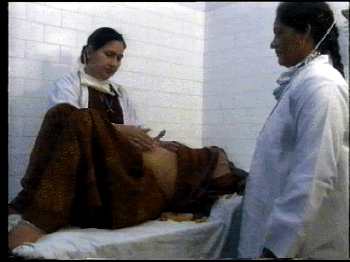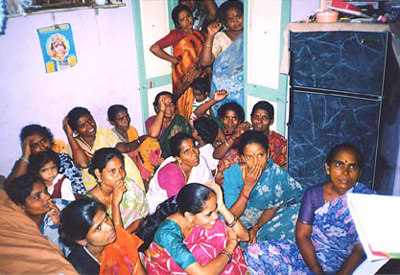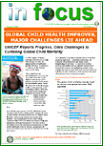|
PUBLIC SERVICE ANNOUNCEMENTS (PSAs) FOR TELEVISION

CECHE media trainees prepare for PSA production
When Yul Brynner was dying of lung cancer, he made an emotional appeal to fellow Americans to quit smoking. When the Center for Communications, Health and the Environment developed its first crop of Russian anti-smoking PSAs in December 1993, it used humor and drama, or played on the viewers' fear of being less attractive to the opposite sex, or stoked a nationalistic spirit in pointing to the lack of warnings on Russian cigarette packets when such warnings are mandatory in the West. Next CECHE produced PSAs with a different approach: sound bites of ex-smokers seeking to persuade their fellow citizens to quit. The people featured in these spots are a father and daughter, a mother, and two middle-aged men in the street. Entitled Taking Charge of Your Health, the five TV spots of between 30 seconds and a minute focus on increased breathlessness, social and familial ostracism, and the need to stop using cigarettes as an emotional prop. CECHE and the production team at Skyscraper Productions, UK, hope that the rationale of ordinary people, presented with passion and commitment, will influence smoking viewers to think again about their own health. A focus group, led by Drs. Vladimir Levshin of the Russian Cancer Research Center in Moscow and Fiona Chew, of the SI Newhouse School of Communication at Syracuse University in Syracuse, is testing the PSAs for social impact prior to planned broadcast on the Open Skies Network throughout the NIS late 1996. CECHE's Take Charge PSA program began in March 1993. These PSAs urge personal steps to avoid substance abuse, to minimize the impact of environmental pollution on health and to consume a healthy diet given limited resources. The program uses existing American PSAs as well as new ones designed and produced in collaboration with local partners. The first series dubbed Your Fate Is In Your Hands, comprised five short programs developed jointly by CECHE, the National Centre for Health Promotion (NCHP) in Prague, Skyscraper Productions in London and Syracuse University at Syracuse. Audience scores for this series meant a resounding success. A second Quit Smoking series focused on substance abuse and encouraged Russians-particularly youth-to change their lifestyle and give up smoking. 
Teen smoking target of CECHE’s PSAs in CEE-NIS
Ostankino TV, as well as, the Open Skies Network of Internews have broadcast the above PSAs and subsequent series. The Open Skies Network involves some 170 stations, covering over 130 million viewers throughout the former Soviet Union. CECHE's 1997 PSAs derived from its Media Training Program in Ukraine. Using video footage from A Family Year, six television producers/directors edited and produced three short PSAs on smoking, diet, and environmental pollution. The PSAs were broadcast on Gravis TV 35 and nationwide on National Television Broadcasting Company in Ukraine in October 1997. Reproductive And Family Health PSAs Produced In Punjab, India Beginning in March 1998, CECHE hosted a two-part Media Fellowship Training program in Chandigarh, India and London, UK on the development of effective health programming, which culminated in the production of a new series of PSAs. Nine television producers/directors and health communications experts from the Technical Teacher’s Training Institute and the Ministry of Health Services, Family Welfare filmed in their local community to ensure culturally relevant material for TV programs and received hands-on training in modern television techniques for effective communication on environmental health-related issues, including. In July, the participants traveled to Skyscraper Productions in London and screened and critiqued their own footage and rough edits, developed storyboards, and worked with online and off-line editors to complete a series of broadcast-ready PSAs and a 20-minute song on breast feeding, weaning, oral rehydration therapy, infant nutrition and tobacco. The Ministry of Health Services, Family Welfare in Punjab is to broadcast the PSA’s and on the regional government television station, Doordarshan, Jalandhar, and CECHE will utilize them as part of the community intervention program. This media training was supported in part by a grant from the American Institute for Cancer Research and cash and in kind contributions from other CECHE sources and the Ministry of Health Services, Family Welfare in Punjab. 
Indian musicians sing praises of a healthy diet and lifestyle in a 20-minute program/song produced for TV by CECHE trainees
Television producers, directors, and health and environmental professionals in Central and Eastern Europe and India are beginning to recognize the importance of mass media in public education and have repeatedly requested CECHE's assistance in developing television programs to educate the public about the environment and health. PSAs have the potential to reach many more viewers than regular programs and to make a reinforcing and long lasting impact because they can be used repeatedly and frequently in various parts of the broadcast schedule. 
Healthy pregnancy featured in CECHE’s Indian PSAs
District of Columbia Target of CECHE PSAs More than half of the District's youth are at risk for substance abuse related to environmental deprivation—parental neglect, substandard housing, poor role models, etc. A recent grant from the DC Department of Health’s Addiction Prevention and Recovery Administration (APRA) enabled CECHE and partners -- APRA’s Project Reachout and DCTV Public Access Cable Television to a series of three substance abuse prevention PSAs targeted to youth and families in Ward 8. Using focus group testing of concepts with youth and heads of households at Stanton Dwellings, CECHE engaged youth to develop a series of three PSA’s: one each on prevention of drugs, tobacco, and alcohol abuse--all geared to making the inner city a clean and healthy community and for broadcast on DCTV Public Access Cable Television. Broadcast will begin in January 2000. A special public service advertisement is also being developed for placement in local newspapers. The PSAs are slated to be audience tested to evaluate their impact on participant knowledge, attitudes and behaviors toward alcohol, drug, and tobacco use. In addition, a poster contest held Project Reachout, produced winning concepts that formed the basis of a poster developed for display throughout the inner city, at Green, Turner, Malcolm X and Garfield elementary schools, and other neighboring schools and communities in Ward 8. The final PSAs and posters are slated to be audience tested to evaluate their impact on participant knowledge, attitudes and behaviors toward alcohol, drug, and tobacco use. Furthermore, CECHE hopes that our website can serve to inform a national and international audience of scientists, educators and health professionals about the Psa’s and posters. (For more information see Substance Abuse PSA). 
“Drug-Free Zone” in Ward 8 supports theme of new CECHE PSAs in the District of Columbia
PSA Testing In South India Illustrates Cultural Divide In July 2000, CECHE tested the impact of four maternal and child health public service announcements (PSAs) on childbearing women in South India. Produced in 1998 as part of a series of television health promotion messages developed in CECHE's media training program in Punjab, India, these PSAs addressed visiting a doctor during pregnancy, breastfeeding, preparing to use a trained birth attendant during birthing, and oral rehydration. They featured vignettes about a mother and her pregnant daughter using a semi-dramatic format and were both broadcast on national television in Punjab and screened on television in local district health clinics. For use in South India, the PSA's were translated into Tamil and shown to socially and economically disadvantaged women from the urban slums of Chennai. 
Chennai women view PSAs and eagerly answer questions
Socially-disadvantaged and economically-disadvantaged women were recruited to participate in the study from the urban slums of Chennai using a snowball sample. They were randomly assigned to a treatment or experimental group (where they viewed the four videos) or to a control group (where no videos were shown). The response rate was 100%. The research objective was to assess whether exposure to a specific PSA would predispose the viewer to adopt the behavior promoted in the PSA. PSAs were tested on 22 women in the experimental group and the responses compared with19 women in the control group. Group responses to questions about which message was preferred or not preferred and why, were also obtained. Newhouse School-trained researcher, Ms. Kalyani Subbiah conducted the fieldwork under the direction of Dr. Chew. Various PSA series are available in English, Russian, Czech, Hindi, and Ukrainian. For more information and purchase see Media Archives |
|
|||||||||||
Questions? Comments? Concerns? E-mail CECHE at CECHE@comcast.net Go back to the CECHE home page Go back to the CECHE home page
|

